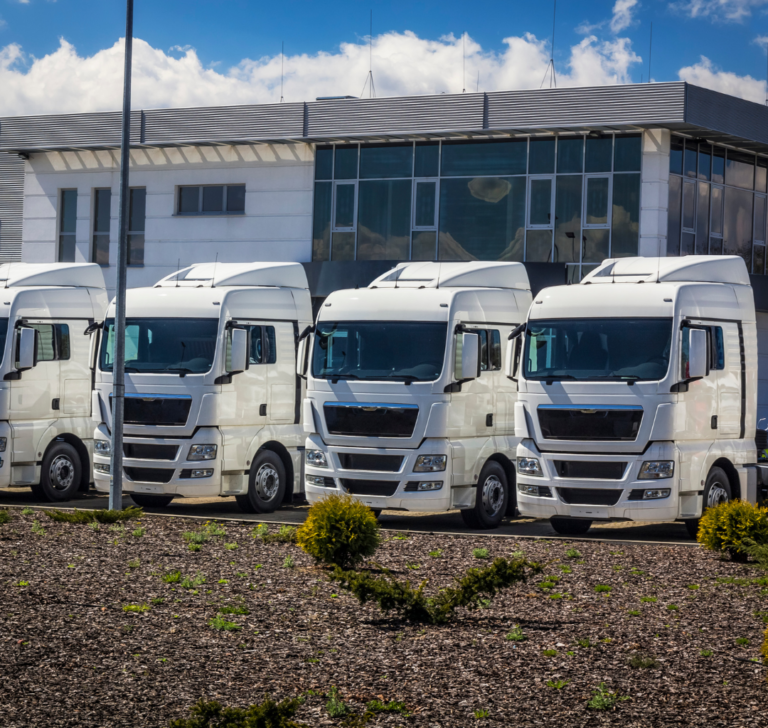If you're wondering whether you need to insure your fleet, the answer is yes
Fleet insurance is a commercial auto insurance policy designed to cover two or more vehicles under a single policy, ideal for business owners or independent drivers with more than one truck under their registration. This type of insurance covers accidents and other liability risks for all vehicles used in their operations.
Given that a significant percentage of traffic accidents occur during work, it’s essential to seriously consider purchasing fleet insurance. This insurance is considered the optimal plan as it saves time, money, and hassle by eliminating the need to acquire individual insurance for each vehicle in the fleet.

Why get fleet insurance?
If you’re wondering whether you need to insure your fleet, the answer is yes. Not having adequate coverage can pose a danger to your vehicles, employees, and business. Here are 6 reasons why having fleet insurance is essential:
1. Cost savings
Typically, acquiring fleet insurance results in significant savings compared to insuring each vehicle separately. This is because insurance companies often offer discounts to businesses with fleets since the risk is spread among multiple vehicles. As a result, premiums per vehicle are generally lower with a fleet insurance policy, reducing overall insurance costs.
Additionally, most fleet insurance plans allow for coverage adjustments to fit the company’s budget and risk tolerance. This ensures that vehicles are adequately covered without exceeding the budget.
2. Comprehensive coverage
Fleet insurance usually protects against liability, collision damage, theft, vandalism, and damages caused by underinsured drivers. This policy includes everything and protects your company from all risks that may affect your vehicles and activities. Additionally, fleet insurance can help expedite repairs and get your company vehicles back on the road faster.
3. Legal compliance
Insurance is a legal requirement in many states. Driving vehicles without the required coverage can result in significant fines, legal consequences, or even business closure. Having fleet insurance ensures compliance with regulations, avoiding legal issues. Fleet insurance also protects the company from legal problems in case of accidents or damages caused by its vehicles or third parties.

4. Ease of management and efficiency improvement
Fleet insurance simplifies processes by consolidating all vehicles under a single policy. This centralization not only makes management easier but also reduces the likelihood of forgetting to update or renew important policies, which could expose the business to unexpected risks. Additionally, it allows quick access to policy data, modifications, claims tracking, and a clear understanding of insurance costs.
5. Adaptation to your needs
Fleet insurance policies are highly flexible and can be tailored to the needs of any business. This allows for coverage adjustments based on budget, risk level, and business needs. Due to its flexibility, fleet insurance is suitable for companies in various sectors.
6. Risk management
Fleet insurers often offer risk management services as part of their packages, such as driver training programs, safety checks, and advice to improve fleet safety. Investing in these preventive measures can reduce the chances of accidents and other problems, thereby decreasing insurance claims. Safer drivers and vehicles mean lower insurance costs in the long run.

State legislations review on speed cameras and red light cameras
States continue to review regulations regarding speed cameras and red light cameras State legislators nationwide continue to review regulations regarding speed cameras and red light

Mothers and truckers: the challenges of being a mother on the road
The biggest challenge lies in the need to care for and provide for the children at the same time Long hours of work, complete dedication,

The deadly consequences of not wearing seatbelts among truck drivers
Seven out of ten truck drivers involved in fatal accidents were not wearing seatbelts During an annual research forum, the FMCSA presented the latest data

Drivers could face license suspension if RTD process is not completed
163,318 holders of CDL and CLP licenses are registered as “prohibited” The latest FMCSA report reveals that 163,318 holders of CDL and CLP licenses are

International Roadcheck: what you need to know about DOT Week 2024
From Tuesday, May 14 to Thursday, May 16, 2024, the International Commercial Vehicle Safety Alliance’s DOT Week 2024 will be held at the International DOT

Marijuana reclassification: implications for CDL drivers and public safety
It seeks to reclassify marijuana from Schedule I to Schedule III, how does this affect shippers? The Biden Administration seeks to reclassify marijuana from Schedule
